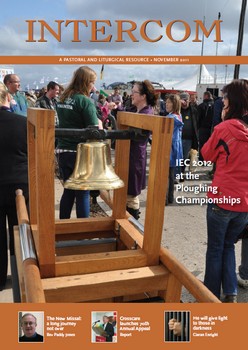November 2011 issue
Click on link to view Intercom November contents
Editorial and Newsletter resources
Feature Article
Restorative Justice
Imelda Wickham
Restorative Justice
That they may have life and have it to the full
A young man in Wheatfield Prison recently showed me a piece of paper with the words Faith and Justice written on it. With a somewhat puzzled expression he said
I think I know what Faith is……but … what is Justice? This young man, one of the current 700 men serving sentences in Wheatfield Prison, posed a question that requires more than a theoretical definition of justice and calls on us to reflect on its true nature and meaning.
To understand justice we need to reflect on the following questions. How is justice meted out to the victims of crime? How is justice meted out to the perpetrators of crime? And how are the needs of local communities, affected by crime, best served?
Within the next few weeks Michael is due to appear before the courts charged with assault causing serious bodily harm. He does not know the victim and he wouldn’t recognise him if they met again. The case is listed for court as Michael Vs the State. In the meantime Michael is in Cloverhill Prison awaiting trial and is totally preoccupied with what sentence he will get. He tells me he is also concerned for the man he assaulted. No doubt this man, the victim, is still traumatised by what happened and wondering why he was the target of such an attack. So whose needs are being served?
The outcome will be a prison sentence for Michael. He will enter the system and very likely come out at the other end without ever adequately addressing his crime or the underlying causes. Imprisonment is about trying to cope with prison life, the sheer boredom, the overcrowding, the frustrations, the violence, the drugs; it is about trying to maintain relationships on the outside and finally facing the prospect of re-entering society as an ex-prisoner and all that that entails for the remainder of life. The outcome for the victim may be a certain satisfaction that justice has been done or more to the point, seen to have been done. But, the lingering question remains – has justice been done?
In this instance if the victim had the opportunity to tell Michael how the crime has affected him, his life and his family and if he had the opportunity to show Michael the damage and distress he has caused, not just the physical but the mental damage he has inflicted Michael would have a greater appreciation of the affects of his action. Maybe too if Michael had the opportunity to talk about his life, not by way of excusing what he has done, but simply as a means whereby the victim is helped to come to some understanding of what happened and why. Such a process is restorative, it is healing and it respects all involved.
James, who is serving a life sentence for the killing of his father, longs for his grandfather’s forgiveness more that anything else. Some years ago he summoned up the courage to write to him seeking some reconciliation. Shortly afterwards his grandfather died without having replied. James was devastated. Something was lost that could never be restored. In spite of the assurance of his family that he had been forgiven he was not convinced. A restorative approach at the time of the crime could have eased the grandfather’s pain of loss, his anger and his desolation. It would have eased the young man’s devastation and utter despair. To day there is a missing piece in his rehabilitation process that can never be restored.
The concept of Restorative Justice has been recognised at international level as having potential for all affected by crime and many countries are currently using the principles and practices of Restorative Justice. In 2009 the National Commission on Restorative Justice in publishing its report stated in its foreword that the commission was “convinced that the implementation of restorative justice on a nationwide basis will make a positive contribution to the lives of all citizens. It went on to state that “victims, offenders, their families and their communities can all benefit from a restorative approach to criminal behaviour. The commission strongly recommended national implementation in a structured way. Two years on, while we await the implementation, our prison population spirals out of control, the damaging effects of imprisonment continue to affect the lives of all citizens and the young man still asks what is justice?
Restorative Justice is person oriented and is about restoring right relationships. It is about making restitution for the wrong done and the harm inflicted. It requires the willingness of all involved to enter the process. And, it requires trained, experienced personnel to carry out the process of healing and reparation. It is the Gospel concept of hating the sin while loving the sinner. It is the call of the Gospel to be reconciled, to forgive. Jesus prayed that they may have life and have it to the full. He included all of us in his prayer, the sinner and the sinned against. He wanted the fullness of life for us all. There can be no fullness of life where there is no healing, no reconciliation or forgiveness. The fullness of life requires right relationships.
True justice is restorative.
Imelda Wickham
To view the article in pdf format, click here.
Intercom
Intercom is a pastoral and liturgical resource magazine published by Veritas, an agency of the Irish Catholic Bishops Commission on Communications.
There are ten issues per year, including double issues for July-August and December-January.
For information on subscribing to Intercom, please contact Ross Delmar (Membership Secretary):
Tel: +353 (0)1 878 8177 Email: [email protected]

